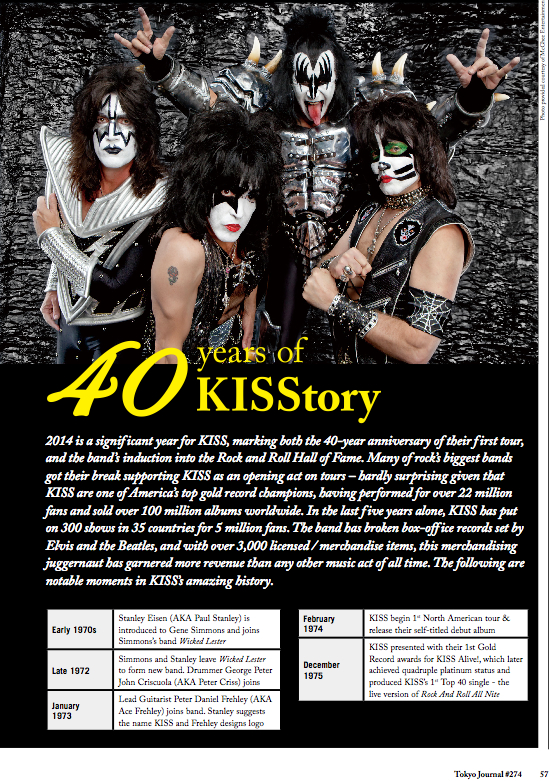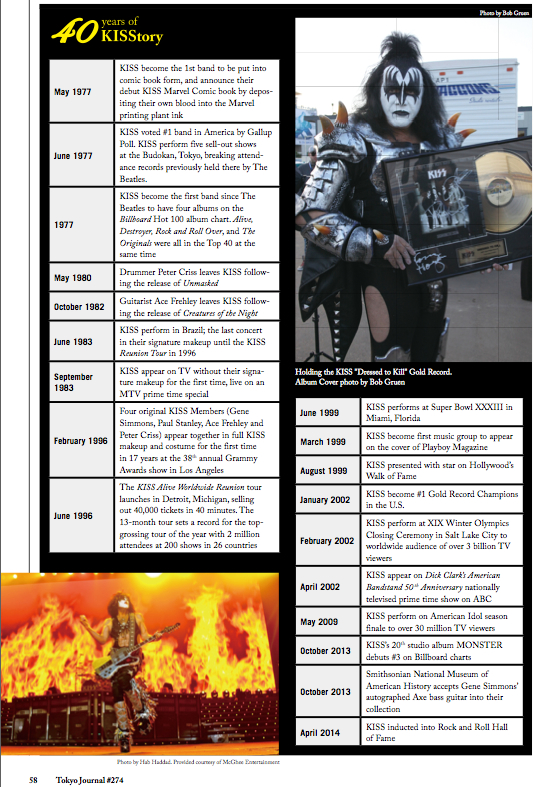Rock ’N’ Roll Samurai
From Legendary Rock and Roll Superstar to Business Warrior, Music Business CEO Gene Simmons Conquers All
Interview by Anthony Al-Jamie
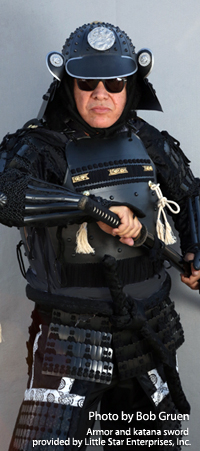 Rock star, producer, publisher, actor, reality TV star, family man, professional sports team owner, entrepreneur and all-round marketing genius: what kind of steroids must one take to master so many ventures with dynamic energy and youthful enthusiasm for over 40 years? To find out, I drove to Gene Simmons’ Beverly Hills mansion. Meeting Gene Simmons was an educational experience from the get-go. Parking on the edge of the large circular driveway to this huge mansion - the kind you only see on a reality TV show - I looked up to see the towering KISS star on top of the staircase, yelling pinpoint directions to me about where to park. Before the interview; before I’d even parked the car, I knew this was a man who was in control. I couldn’t help but feel intimidated, but as I entered his palatial estate Simmons greeted me with a kind smile and, knowing that I had lived in Japan for many years, introduced himself in perfect Japanese using all the politest forms of the language. He offered me a cup of coffee and asked me to wait in his office, which doubles as a KISS museum. It includes literally thousands of unique KISS and Gene Simmons branded memorabilia – everything from motor scooters to pachinko machines!
Rock star, producer, publisher, actor, reality TV star, family man, professional sports team owner, entrepreneur and all-round marketing genius: what kind of steroids must one take to master so many ventures with dynamic energy and youthful enthusiasm for over 40 years? To find out, I drove to Gene Simmons’ Beverly Hills mansion. Meeting Gene Simmons was an educational experience from the get-go. Parking on the edge of the large circular driveway to this huge mansion - the kind you only see on a reality TV show - I looked up to see the towering KISS star on top of the staircase, yelling pinpoint directions to me about where to park. Before the interview; before I’d even parked the car, I knew this was a man who was in control. I couldn’t help but feel intimidated, but as I entered his palatial estate Simmons greeted me with a kind smile and, knowing that I had lived in Japan for many years, introduced himself in perfect Japanese using all the politest forms of the language. He offered me a cup of coffee and asked me to wait in his office, which doubles as a KISS museum. It includes literally thousands of unique KISS and Gene Simmons branded memorabilia – everything from motor scooters to pachinko machines!
TJ: I’ve lived in Japan for 20 years and I was surprised to hear how well you speak Japanese. Your pronunciation is spot-on!
SIMMONS: Well, I know enough to say to a girl, “Anata wa utsukushii. Anata wa saiko desu! Mina san hakushu!” and all that stuff. Just a few phrases. Let’s put it this way: if I landed in Japan, I could find the bathroom, get a good night sleep and tell a girl she’s beautiful, which is, after all, all you need!
TJ: It’s a sign of respect for someone’s culture when you make an effort to learn the language, isn’t it?
SIMMONS: Well, that’s exactly right. When in Rome, do as the Romans do. When you go to another culture, it’s time to buckle your knees, bow and give respect because the people, the language, and the culture have been around forever.
TJ: So, Gene, you’re originally from Israel, right?
SIMMONS: Yeah, I don’t look Swiss, do I?
TJ: Why did you change your name from Chaim Witz to Gene Simmons? I think Witz sounded pretty cool.
SIMMONS: It doesn’t work.
TJ: No?
SIMMONS: Your name doesn’t either.
TJ: What?
SIMMONS: It doesn’t work!
TJ: So should I just use my first name as my last name – Anthony?
SIMMONS: What’s your middle name?
TJ: Mark.
SIMMONS: Well, there you go. Mark Anthony. You know what? It sounds pretty darn good and no one is going to ask you how to spell it. People have preconceived notions. So, when you go to a funeral, put on something dark. People judge you by the first impression, which is what you look like, your name, how you dress, how you walk, how you talk, people skills. You’re allowed to mix it up and get any reaction you want, but if you want to slide through and take the express... check out my next book. It is all about that: “ME, Inc.” Certain things [we] can’t change - our racial type, our height, etc. Those things that we can change, I decided to take control of. Dress British. Think Yiddish. The ones who survive in the animal kingdom are the chameleons who blend in, and nature does that - your skin pelt, your color, changes with the environment. There are no bright red or bright yellow animals who are landlocked. They might fly through the air but even that’s not a good idea because they can be seen by the hawks.
TJ: Did you just plug your book?
SIMMONS: This message was brought to you by Gene Simmons.
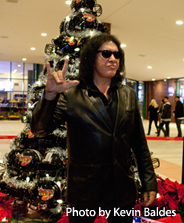 TJ: So, on with the interview. When was the first time that you visited Japan?
TJ: So, on with the interview. When was the first time that you visited Japan?
SIMMONS: KISS first went to Japan in 1977, and it was like Beatlemania. In Tokyo, the big arena was Budokan. The Beatles had played there, and sold it out three consecutive nights. We played it five nights and broke the Beatles record. When we landed at the airport, there were literally thousands of fans. We came off of our 747 jet and it was a Pan Am, which at the time was a world leader. Pan Am was so excited by it that they put KISS on the side of the jet, so it was the KISS Clipper 747. The entire plane was filled with journalists and people from all over the world that we brought over on our dime. We stepped off the jet in full KISS makeup, because we knew the media was going to be there, and when we got to the Japanese officials, they were very gracious, but said, “You don’t look like the photos in your passports. You have to take the makeup off.” Here we are - we had spent two hours putting the makeup on, we had to take the makeup off, and then an official looked at the photos and our faces and said, “Yes, it’s you. OK, you can pass.” Then we had to go back to another room and put the makeup back on, because we knew the fans were out there. We then got into limousines and there was another set of limousines that drove off with imitators so that the fans would jump on them like locusts and start to shake the cars. Some figured out we were there when we came in with our makeup. It was an amazing time. We always go back to Japan. It’s an amazing place.
TJ: Had you travelled before Japan as a band?
SIMMONS: We had been to England and Europe, but had yet to hit the world stage.
TJ: So it must have been quite the shock to you to see the fans the first time you arrived. Or did you know you had this huge following there?
SIMMONS: We had heard about it. It all started with our second album “Hotter than Hell.” The album art director, a guy named Norman Seeff, an accomplished photographer, decided to have a Japanese motif with certain words written in Japanese. So when people both in the U.S. and Japan saw the Japanese on the cover, they thought we were a Japanese band - until of course, when they saw our size, because physically we were much bigger than the average Japanese even without the boots.
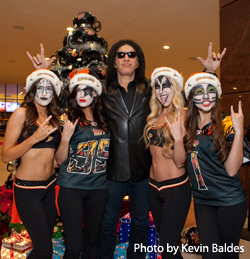 TJ: And what were the fans like?
TJ: And what were the fans like?
SIMMONS: Oh, it was pretty crazy. We had never seen this anywhere else in the world. The concerts were crazy but they were not allowed to stand during the concerts. The police were going around with dogs and they had to sit and be courteous because that was the Japanese way. They were not allowed to be over-enthusiastic. At the end of every song, they’d be allowed to clap but not allowed to stand and nobody in the aisles. Then at the end they were escorted out in an orderly way. We had never seen anything like it. It has changed. Now it’s become more westernized and if you want to jump up and down and scream, you can - now. Many of the fans came dressed in makeup with their own unique look.
TJ: What are you doing in Japan these days?
SIMMONS: As you know, we just toured Japan recently and we’ve teamed up with Hello Kitty for KISS Hello Kitty. A KISS Hello Kitty TV show is starting production soon and will be seen around the world later this year.
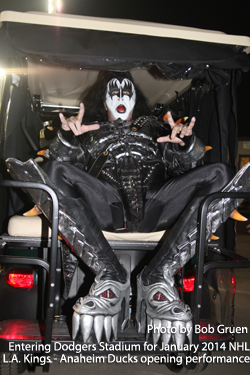 TJ: Was there any aspect of Japan that influenced KISS in any way?
TJ: Was there any aspect of Japan that influenced KISS in any way?
SIMMONS: People point to Kabuki theater, especially my persona with the armor, comparing it to that of the shogun and samurai, but it really happened naturally. We didn’t study it. I was fairly well read and I was aware that in 1853 Admiral Perry sailed into the harbor, and it was basically a clannish feudal society up until then in self-imposed isolation for more than 200 years until the U.S. Navy demanded Japan open its trade to the west, and within something like 50 years, Japan beat Russia in the Russo-Japanese War. So, by the early 20th century, [Japan] arrived on the world stage and was able to challenge one of the major powers. So I knew a little bit about Japanese history, but as for the makeup, it just sort of happened. Since then, KISS has grown into a culture. It’s not just a band. It’s a brand. People name their children after us. They have KISS conventions all over the world. They tattoo their bodies with our faces! It’s quite remarkable. But I do have boots that were influenced by Godzilla. When I was a kid, I’ll never forget watching the end of the movie when Godzilla completely destroys Tokyo, and it starts to go back into the water unchallenged. There’s a little boy waving, saying “Good-bye Godzilla. Thank you for destroying civilization! Good-bye!” It was so surreal to me. It was like his best friend just killed his parents and destroyed all of civilization. “Good-bye!” It’s the most bizarre thing. But I remember as a kid sort of tearing up thinking, “Godzilla, please don’t go!”
TJ: Did you have any interest in Japanese movies like Kurosawa films?
SIMMONS: Oh, sure! Kurosawa, Seven Samurai, Ran… but also the pop culture stuff. The Mysterians was a sci-fi movie. It’s ridiculous by today’s standards but then I thought it was the coolest because these aliens come to earth and they take over. Japanese culture exploded with all the kids’ shows - Power Rangers and Digimon and all that stuff.
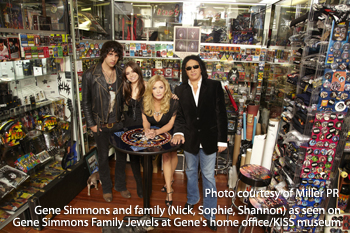 TJ: I understand your wedding was planned by Yoshitaka Nojiri, a Japanese wedding planner?
TJ: I understand your wedding was planned by Yoshitaka Nojiri, a Japanese wedding planner?
SIMMONS: He was fantastic! His company is the absolute finest, most gracious, and professional entity I’ve come to work with! It was fast, quiet, professional, and thorough. We were renewing our vows. Before we were even done with the party, we were watching the fully edited video with music! They acted like: just have your vows. Forget about us. But while it was all going on, a full staff of about 30 people were taking photos, videoing and editing all at the same time. I’ve never seen anything like it.
TJ: What do you like about Japan?
SIMMONS:You can go to different parts of Japan and see a modern city with skyscrapers, geisha walking down the street, the huge Buddha, or just take the bullet train and see amazing scenery. And any second I expect to see Rodan, Ghidorah, Mothra and Godzilla to come over those mountains!
TJ: Do you like Japanese food at all? I heard you’re a burger guy.
SIMMONS: Well, I’m not a fan of anything that looks like a cockroach. If you’ve got eight legs and tentacles and little beady eyes and you’re the size of a… I can’t. I’m not a fan of suction cups. I will say that the best beef I ever had was Kobe beef in a restaurant that was cooked right there. I’m a chicken and a burger guy. I literally cannot look at people eating raw food. I can’t do it. As a student of history, I know that a long time ago, man invented fire, and they did a weird thing - the meat that they killed, they put into the fire and cooked it! You don’t have to eat it raw anymore! How about the jumbo shrimp and things like that that they stick on the grill that go “Eeeeek” with their legs flying out? They make these high-pitched sounds. You can see their eyes going, “Oh, s**t! Oh, f**k! What’s going to happen? Do you think they’re gonna… No, they wouldn’t dare! Oh, s**t!”
TJ: So you speak some other languages. You have some understanding of Hungarian, is that right?
SIMMONS: I’m fluent in Hungarian. I can get by in German, Hebrew and English.
TJ: How did you learn these languages?
SIMMONS: My mother and my father are Hungarian and although we hardly ever spoke it, I picked it up. I learned German because I took it for six months in school and then we toured Germany; Hebrew because I was born in Israel, and a few phrases in Japanese because when you go someplace, make an effort. Learn a little bit about the culture and the language.
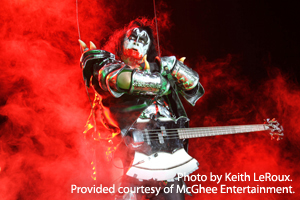 TJ: And has that helped you in business, would you say?
TJ: And has that helped you in business, would you say?
SIMMONS: Well, here I am talking to you! The Tokyo Journal is a big deal! It’s important to reach out. The arrogance of American businessmen in the 50s and 60s… they would just land in Tokyo and assume that everyone spoke English. That’s why I partnered with Ortsbo, which is a universal language translator so you can communicate in any language.
TJ: Can you tell me about the band EZO?
SIMMONS: They were a Japanese band. In Japan they were called Flatbacker. Amuse America, which is a Japanese entertainment company, liked what I produced because I produced a few bands before like Keel, Black ’n Blue, Doro and lots of other bands as well as some KISS records. I thought there might be an opportunity for a Japanese band singing in English to break through. Loudness had made a little bit of noise. But in the history of recorded music there has only been one #1 Japanese song in all time! It was Sukiyaki by Sakamoto Kyu, which has been covered more than once, but nobody can remember the guy’s name. When EZO came to America and I decided to produce them, the deal was set. They were going to be on Geffen Records, I believe. It was a very difficult process because they didn’t speak a word of English. They knew a few rock and roll terms. “A Chord”… “C Minor Chord.” So they came and I arranged the chords, melodies and stuff like that but I didn’t have the time to do all of it so I brought in a few other guys who co-wrote stuff. It’s a damn good record if I must say. Lots of musicians point to it as a sort of pivotal record, but when they appeared live something didn’t connect in the American market.
TJ: Maybe they were a little early.
SIMMONS: Well, it’s still early. There is no African-American rock band. There’s no Asian rock band in America. There’s no rock band from India. There’s no Hasidic-Jewish rock band. There just aren’t!
TJ: I was at a K-Pop concert a while back and Quincy Jones was sitting next to me so I guess he’s got his eye on Asian bands. Are you planning on producing more Asian bands?
SIMMONS: Yeah, but Quincy doesn’t do rock and modern stuff. He’s in pop. I’d love to do Asian bands, but I would urge Asian bands not to look for rock as their thing because there’s a template, a stereotype, and it’s hard to break through it.
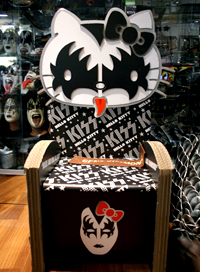 TJ: What do you think about the service in Japan?
TJ: What do you think about the service in Japan?
SIMMONS: I’d have to say because of Japanese culture, the service is on a much higher level than in America. All of the hotels that we stayed at in Japan were terrific. I love the limo drivers and the cab drivers coming out fully dressed with gloves on and opening the doors for you. But in America, the culture and service mentality is very different. American culture comes from the bottom-up, instead of European, Japanese and other cultures where the culture comes from the top-down. It’s hard to go into a high-end French cuisine restaurant and say, “Let me have a burger and some ketchup.” because you are not just ordering food, you’re making a statement about class and culture. You really want a burger. Your mouth is watering for one and you love ketchup but it’s actually an insult to the other culture if you want to eat whatever you want to eat. You’re thinking, “Look, I respect your culture, but I don’t want to eat f**kin’ snails! I just want a f**ckin’ burger!” Pretty much everywhere else in the world, it’s about good taste, but America just wants it to taste good, and wherever you go in the world everybody eats hamburgers, wears jeans and listens to American music. You need to understand what the market is. I don’t care what your culture is, just give people what they want. The philosophy of Burger King is “Have it your way.” But the French-European mentality is, “I’m the Chef! It’s not the way you eat my food.” He’s dictating to you what you should do. And you’re paying for the privilege? Bitch? I’m the boss! If I want you to spit in my burger, that’s what you’re going to do! That’s the American way! It’s the same in England, too! You sit down. Not a ketchup bottle out. You ask, “Can I have some ketchup?” They say, “These Americans…”
TJ: So you were originally a teacher? Is that correct?
SIMMONS: A sixth grade teacher, but it was difficult because these kids were ghetto kids in Spanish Harlem, New York City. I must have been 22. In the afternoon I was a check out guy at a delicatessen. Then I started working as the assistant to the editor of Vogue. I had a revelation if you will ….I thought the reason I wanted to become a teacher was for altruistic notions - to give back and so on. But it really wasn’t that. I wanted to be up on stage and be listened to and admired because delusionally I think I have something to say. Probably comes with being an only child.
TJ: So now your classroom has grown to the size of a stadium?
SIMMONS:Millions of people, yeah.
TJ: You have a great relationship with your mother. Do you ever ask her for business advice?
SIMMONS: My mother? Jews don’t have saints but she is as close as you can get. I don’t ask her, but she gives it. Her business advice comes in the form of life lessons and very incisive assessments. I handed her a check early on in the ’70s for a few million dollars and I said, “Mom, look! I made $10 million!” She said something wonderful, “Now what are you going to do?” She’s right! And so if you apply it to Warren Buffett, Carlos Slim, Rupert Murdoch and all the other guys, they get up every day and they don’t think about what they’ve got. They just get up and go to work.
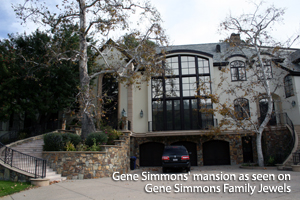 TJ: So it’s not just about the money?
TJ: So it’s not just about the money?
SIMMONS: The irony is for the guys with the most money, it’s really not about the money. The people who it’s really about the money for are the 9 to 5 people, the vast majority of people - for whom it’s life or death. It’s survival. It’s the loaf of bread. They don’t have as much as they need to get a decent house and get the kids’ education and stuff like that. They hate their jobs but they only do it for money. But if you wanted to become a rock star or a venture capitalist and you’re making buckets of money and you love what you’re doing and someone asks you why you are doing this, and you say, “Oh, I’m just doing it for the money,” they are so insulted! If I have a hit and tour with the band and I go, “Whoopee! I made $100 million!” They say, “It’s bragging.” If you win the lottery for $100 million and you run down the street, “Whoopee! I won $100 million!” They say, “Cool!” But I worked for it! That bitch just had a lucky ticket! Can you please help me out on this? Where’s the justice?
TJ: That is ironic. Did you learn anything else from your mother about business?
SIMMONS: Oh, sure! My father left us when I was about seven, so there was just my mother and I. (I didn’t know about my half brothers and sisters until I was in my late fifties/ early sixties). I’m 64…and boy, do I look good! Anyway, my mother was not really educated in a classic sense of the word, but she was duly diligent. She could balance her own budget. She knew how much she made every week. Pennies! We paid our bills. We never borrowed money. A sound business mom. So through her eyes I learned how to make the dollar stretch which is to minimize your financial exposure, how to balance your budget, don’t spend more than you make, and make a lot more because you still have to pay tax! Every dollar you spend is after tax money. Just all that stuff…
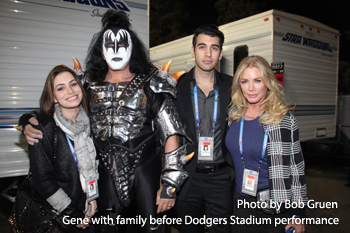 TJ: Do you have a business mentor?
TJ: Do you have a business mentor?
SIMMONS: Life is the best lesson. What doesn’t kill you makes you stronger. Some basic precepts are hang out with people who are more successful than you are, hang out with people who know more than you do, don’t hang out with people who do nothing. Don’t go drinking and the obvious things. You know, your mother was right. Don’t get high. Don’t spend money on stupid stuff. Eat your vegetables. She was right! And your stupid friends who said, “Aw, let’s get high. Let’s smoke. Let’s drink.” They are your enemy. They are the most unqualified, inexperienced people to determine what you are going to do in life. Talk to somebody who has already been through life and has their experiences - your mother and your father (if he’s there) because they’ve learned some stuff, take what they’ve learned and hang out with older people and listen to what they’ve learned, and sort of make up your own puzzle. My heroes are not basketball players because that’s a flawed model. Putting all of your eggs in one basket is the height of stupidity. Basketball players are tall. They have an advantage. They can play basketball. Great! Hopefully you can hit it big. If you don’t, you’re f**ked! If you can barely put a sentence together and you have no skills, you’re going to be asking the next person in line, “Would you like some fries with that?” So, it’s a flawed business model. How many years do you have of being a successful basketball player? I’m talking about rock stars too, because it’s basically based on a youth model. Billy Joel and Elton John are older and so am I but those are the exceptions. You are talking about tens of thousands that went before them that are not around. Wang Chung had two #1 records. I defy you to tell me who is in the band. Or Loverboy. They had a #1 record.
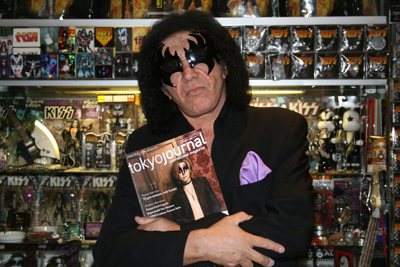 TJ: How did you learn management? You’re really a marketing mastermind.
TJ: How did you learn management? You’re really a marketing mastermind.
SIMMONS: I’m a voracious reader. I read all kinds of things I’m not necessarily interested in and go, “Gee! I didn’t know that.” But there is no such thing as a mastermind. Everyday you wake up and you try to figure out how to make something work. Look at the animal kingdom and survival; we became bipeds because we were flexible and we figured out the more we could stand up, the less we had to rely on all fours. When we were Australopithecus afarensis on the plains of Africa, the ones who were able to stand up were able to see farther over the grasslands and see a predator earlier could survive. That’s why tall, dark and handsome is still a phrase that is used. It’s a biological imperative in nature. We don’t even know why that’s appealing but the taller ones get to survive.
TJ: Yeah, but short people live longer!
SIMMONS: That’s right. And they’re the most powerful men in history. But there is nature and there is nurture. Nature is very important. You’ve got to realize that. And then it’s about nurturing and what you do with it. The most powerful people in history were men and they were all short. Caesar and Hitler and all of them. Scientists tell us that even Jesus may have been about 5’4”.
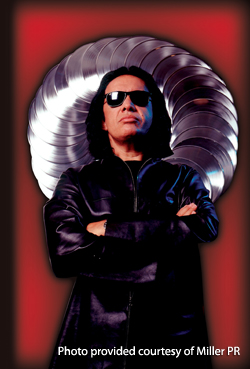 TJ: So would you have been just as successful if you were short, overweight, bald and had a stubby tongue?
TJ: So would you have been just as successful if you were short, overweight, bald and had a stubby tongue?
SIMMONS: Sure! I wouldn’t have been in a rock band. Maybe in venture capital. In other words, every walk of life has different costumes. Detectives look a certain way and politicians look a certain way. We all wear different costumes.
TJ: Speaking of costumes, during the first years of KISS you hid your identity. Was that stressful?
SIMMONS: Sure! But I was being paid a lot. That was from ’74 to ’83. It was a very stressful time. You know, anywhere you went, people were trying to get your photos and in those days there was a $25,000 reward for paparazzi getting us without our makeup. So I was always running around with handkerchiefs over my face. By the late ’70s I had become friendly with Cher and we moved in together so they were always trying to get our photo. After Cher there was Diana Ross and they were always trying to get photos of us. You couldn’t go to a restaurant or go outside without people hounding you. But look. Let’s just put it into context. It beats digging a ditch! Ok? Relatively speaking. Me thinks he doth protest too much!
TJ: Let’s get into the business side of things again.
SIMMONS: Well, life is business. Everything you do impacts your climb to the top or you go down. It’s who you’re around, what you learn, what you don’t learn, and what opportunity passes you by that you don’t take advantage of. All those things will add to or subtract from your climb up the ladder of success.
TJ: Besides KISS are there musical artists that you’ve worked with?
SIMMONS: Well I discovered Van Halen and produced their 15 song demo. I also used to manage Liza Minnelli.
TJ: Yes, and I know you once talked Eddie Van Halen out of joining KISS! People would be surprised to know about all of the different things you are actually involved in. Can you tell us about a few of the things you do outside of music?
SIMMONS: If you go to genesimmons.com you can see the companies I’m involved in. There is Cool Springs Life Equity Strategy, which loans as much as $300 million to individuals with a net worth of over $20 million. There’s Simmons Books that publishes books and comic books, Simmons Records, and just lots of stuff. I own L.A. KISS football. We had Gene Simmons Family Jewels, a TV show that lasted 167 episodes.
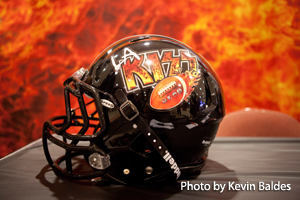 TJ: And what are your most recent ventures?
TJ: And what are your most recent ventures?
SIMMONS: We have Rock and Brews, which is a restaurant chain. The newest store site is on Maui. In addition to KISS playing Dodgers Stadium for the NHL, we’re doing some filming for LA KISS Football which is not only on ESPN from April but we will also have our own reality show on AMC which is one of the main broadcasters on cable, and of course, KISS has thousands of licensed products - anything you can imagine.
TJ: How did you first start licensing?
SIMMONS: It happened very naturally. We started in ’73 but in February ’74 our first record came out and what we noticed right away was that our logo started to appear on t-shirts. We didn’t know about marketing. People didn’t start to use that term. People didn’t even use the term “brand”. It didn’t mean anything. Pop culture hadn’t caught up with reality. Reality was that people wanted to wear t-shirts and somehow loudly proclaim to people who they were, what they believed in, and sort of wear the colors of your gang if you will. Just like military wear their uniform, they wanted to have a sense of belonging. And when that KISS logo first hit, we noticed fans, even when we were third on the bill, started wearing those t-shirts. So we went, “Uh-oh!” Opportunity knocks. Open the door and take advantage. So from ’74 to ’79 KISS became a singularity (which is a big word like gymnasium). 20th Century Fox in those days handled licensing and merchandising for events. #1 was Star Wars. #2 was KISS. And we were so big and so successful so fast that we had our own warehouse in the valley here in Los Angeles fulfilling orders of cash that came in through the mail because we had envelopes with photos of what you could order inside of our albums, which nobody had ever done before. It was the height of uncoolness. Except, I win. I don’t know where Foghat is today but…we license almost anything: Maybelline eye makeup to anything you can imagine. Anything from KISS condoms to KISS caskets - we’ll get you coming and we’ll get you going!
TJ: And are record sales a big part of your business?
SIMMONS: Well the old model of record sales is flawed. That’s not where you make the real money. The real money is in live performances. If you’re lucky, and KISS is very lucky, [the money is] in licensing and merchandising. If you go on tour, and it’s a successful world tour, playing stadiums, and in some places selling out arenas, you can make a hundred million dollars gross, and you can go as far as 300 million or more if you stay out there long enough. You can get up on stage at a stadium and make multiple millions for one night, but it’s up to you to limit the costs, so that your profit margin is relatively high. In licensing and merchandising, when we played, for instance, at the Tokyo Dome, which they call “The Big Egg”, we sold out and made a lot of money. With 55,000 fans there was $1.2 million just in t-shirt sales.
TJ: You mentioned your book earlier. Can you tell us more about it?
SIMMONS: I’ve written a few. The new one is ME, Inc. through HarperCollins Books. It’s coming out in the spring or summer. The forward is about John Varvatos who was a kid that came from nowhere and it’s basically a business book for dummies. It talks about how everything you learn in general public school does not prepare you for life. You can learn that Columbus discovered America in 1492, which is untrue - Indians were here for 50,000 years, and the Vikings came and landed in North America - but let’s say it’s true. How does that prepare you to pay the rent? It doesn’t. You have to figure it out for yourself. So in business terms you have an inferred fiduciary duty to yourself.
TJ: And you own a marketing company too?
SIMMONS: Yes, I did marketing for IndyCar, which was then called IRL (Indy Racing League). I said, “You have to give me $2 million a year and 15% of everything I bring in, and the first thing is: your name blows. It sounds like a communicable disease. I hope I don’t catch IRL!” They said, “Well, we can’t. We’ve been around 92 years. Everybody knows IRL means….” Actually the masses don’t know anything. The only thing they had is the Indy 500, which everybody knows about and the rest of the races are invisible. I told them, “Take the Indy magic, spread it across and call it “IndyCar” because that’s what you are.” And they did. And their business skyrocketed. And then I created a campaign called, “I am Indy” with a song, “Because I love the way I feel when I get behind the wheel. I am Indy.” I changed my name. If you want, you can change yours and so can they. And Citibank became Citi.
TJ: So when you consult, you don’t beat around the bush much. I guess marketing consultants have to be aggressive.
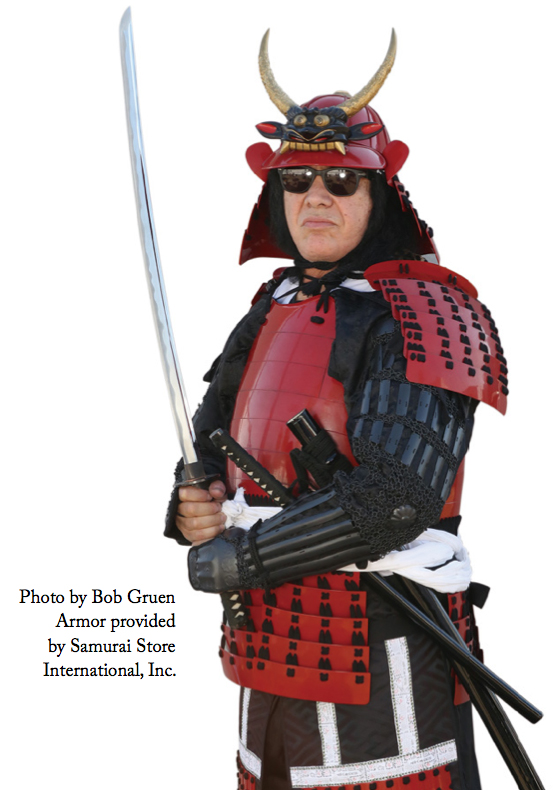 SIMMONS: It’s called tough love… and marketers are highly overrated. Because if someone says, “Here’s what you should do…” I say, “Whoah… what’s your qualification and what’s your resume? First I want to know who are you? What have you accomplished? What have you created to validate what you are about to say? For instance, there are a lot of acting coaches that have never been in movies or TV that tell everyone how to act. I’m suspicious of that.
SIMMONS: It’s called tough love… and marketers are highly overrated. Because if someone says, “Here’s what you should do…” I say, “Whoah… what’s your qualification and what’s your resume? First I want to know who are you? What have you accomplished? What have you created to validate what you are about to say? For instance, there are a lot of acting coaches that have never been in movies or TV that tell everyone how to act. I’m suspicious of that.
TJ: OK, to wrap things up, will you be returning to Japan soon?
SIMMONS: Yes, we will tour Japan. We start touring this summer. It’s the 40th Anniversary KISS Tour, a world tour. tj
The original article can be found in Issue #274 of the Tokyo Journal. Click here to order from Amazon.
